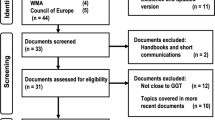Abstract
Rapid developments of biomedical science have initiated different fora to take stand on the protection of human rights and human dignity. In front of the new genomic era with the completion of the Human Genome Project in 2003, a plethora of instruments addressing human genetic testing emerged, some looking suspiciously like legal acts. The notion of genetic exceptionalism was characteristic to the normative reactions in the legal acts, but it can be questioned how justified this is. Despite the critique on genetic exceptionalism, it is argued that in certain situations detection of a serious genetic anomaly may cause extra anxiety in a person tested, if the knowledge has a great significance also to family members. Regulative needs should depend on the context and purpose of the test. This review examines the legal framework governing the use of genetic tests in the clinical setting in Western Europe. Five countries have enacted genetic specific laws, and three have comprehensive provisions pertaining genetic testing in their biomedical legislation. Central provisions cover informed consent, autonomy and integrity of the person tested, further uses of tests results, quality requirements of the personnel and facilities involved. Moreover, contemporary challenges related to whole genome sequencing, direct-to-consumer genetic tests and insurance are briefly discussed.
Similar content being viewed by others
Notes
For an overview on US legislation, see Hudson 2011
For a timely list of ratifications, see www.coe.int/bioethics
An English translation is at http://www.eurogentest.org/professionals/ethical_and_legal/
Comparative law is a specific legal academic discipline that studies differences of legal systems, legal orders and laws of different countries. It aspires to go further into the local legal culture and history to be able to understand and explain normative structures and solutions in a given country.
References
Benoît-Rohmer and Klebes (2005) Council of Europe law. Towards a pan-European legal area, Council of Europe, Strasbourg
Cassiman J-J (2011) Some considerations about a report on ‘Public health in an era of genomic-based and personalized medicine’ from the Public Health Foundation, Cambridge. J Community Genet 2:107–109
EC Expert Group (2004) 25 recommendations on the ethical, legal and social implications of genetic testing. European Communities, Brussels
EGE - European Group on Ethics in Science and New Technologies (2003) Statement on advertising genetic tests via the internet
European Society of Human Genetics (ESHG) (2010) Statement of the ESHG on direct-to-consumer genetic testing for health-related purposes. Eur J Hum Genet 18(12):1271–1273
Feinberg AP (2008) Epigenetics at the epicenter of modern medicine. JAMA 299(11):1345–1350
PHG Foundation (2010) Public health in an era of genome-based and personalised medicine. ISBN 978-1-907198-06-9. Available at www.phgfoundation.org. Accessed on 15 Sept 2011
Gostin LO, Hodge JG Jr (1999) Genetic privacy and the law: an end to genetic exceptionalism. Jurimetrics 40:21–58
Harper PS (2008) A short history of medical genetics. Oxford University Press, Inc
HGC Human Genetics Commission (2010) The Common Framework of Principles 2010. www.hgc.gov.uk
Hogarth, Stuart and Melzer, David. IVD-directive and genetic testing. Problems and proposals. A briefing presented to the 20th meeting of Competent Authorities Lisbon, July 2007. Available at www.eshg.org. Accessed 27 August 2010
Hudson KL (2011) Genomics, health care, and society. NEJM 365(11):1033–1041
Knoppers BM, Saginur M (2005) The Babel of genetic data terminology. Nat Biotech 23(8):925–927
Kraft P, Hunter DJ (2009) Genetic risk prediction—are we there ye. NEJM 360(17):1701–1703
Krajewska A (2009) Conceptual quandaries about genetic data—a comparative perspective. Eur J Health Law 16:7–26. doi:10.1163/157180909X400204
Laurie, Graeme (2002) Genetic privacy: a challenge to medico-legal norms. Cambridge University Press
Lifton RP (2010) Individual genomes on the horizon. NEJM 362(13):1235–1236
Morgan, and Young (2007) An introduction to law and regulation. Cambridge University Press. Cambridge, UK
Organisation for Economic Co-operation and Development (2007) Guidelines for quality assurance in molecular genetic testing. OECD: Paris, France
Patch C, Sequieros J, Cornel MC (2009) Genetic horoscopes: is it all in the genes? Points for regulatory control of direct-to-consumer genetic testing. Eur J Hum Genet 17:857–859
Pinto-Basto J, Guimarães B, Rantanen E et al (2010) Scope of definitions of genetic testing: evidence from a EuroGentest Survey. J Community Genet 1:29–35
Rothstein MA (2005) Genetic exceptionalism and legislative pragmatism. Hastings Center Report 35(4):27–33
Rynning Elisabeth (2011) Still no Patients’ Act in Sweden—reasons and implications in Elisabeth Rynning & Mette Hartlev (Eds.) Nordic Health Law in a European Context—Welfare state perspectives on patients’ rights and biomedicine. Liber AB,Sweden
Soini S, Matthijs G, Aymé S (2008) Patenting and licensing in genetic testing. ethical, legal and social issues. Eur J Hum Genet 16:S10–S50
Vialla F (2006) La loi de 2004 au regard des évolutions en bioéthique in Dix and des lois de bioéthique en France. Revue générale de droit médical, Les Études Hospitalièrs Éditions, Bordeaux
WHO (2003) Review of Ethical Issues in Medical Genetics. Report of Consultants to WHO Professors D.C Wertz, J.C Fletcher and K. Berg. World Health Organisation
Conflict of interest
The author declares that she has no conflict of interest.
Author information
Authors and Affiliations
Corresponding author
Additional information
Western Europe, in this text, comprises the Nordic countries and German and French-speaking countries, as well as Spain and Portugal. The UK does not have specific genetic legislation. The choice of countries is based on language (Nordic, German, Latin, and English).
Rights and permissions
About this article
Cite this article
Soini, S. Genetic testing legislation in Western Europe—a fluctuating regulatory target. J Community Genet 3, 143–153 (2012). https://doi.org/10.1007/s12687-012-0078-0
Received:
Accepted:
Published:
Issue Date:
DOI: https://doi.org/10.1007/s12687-012-0078-0




